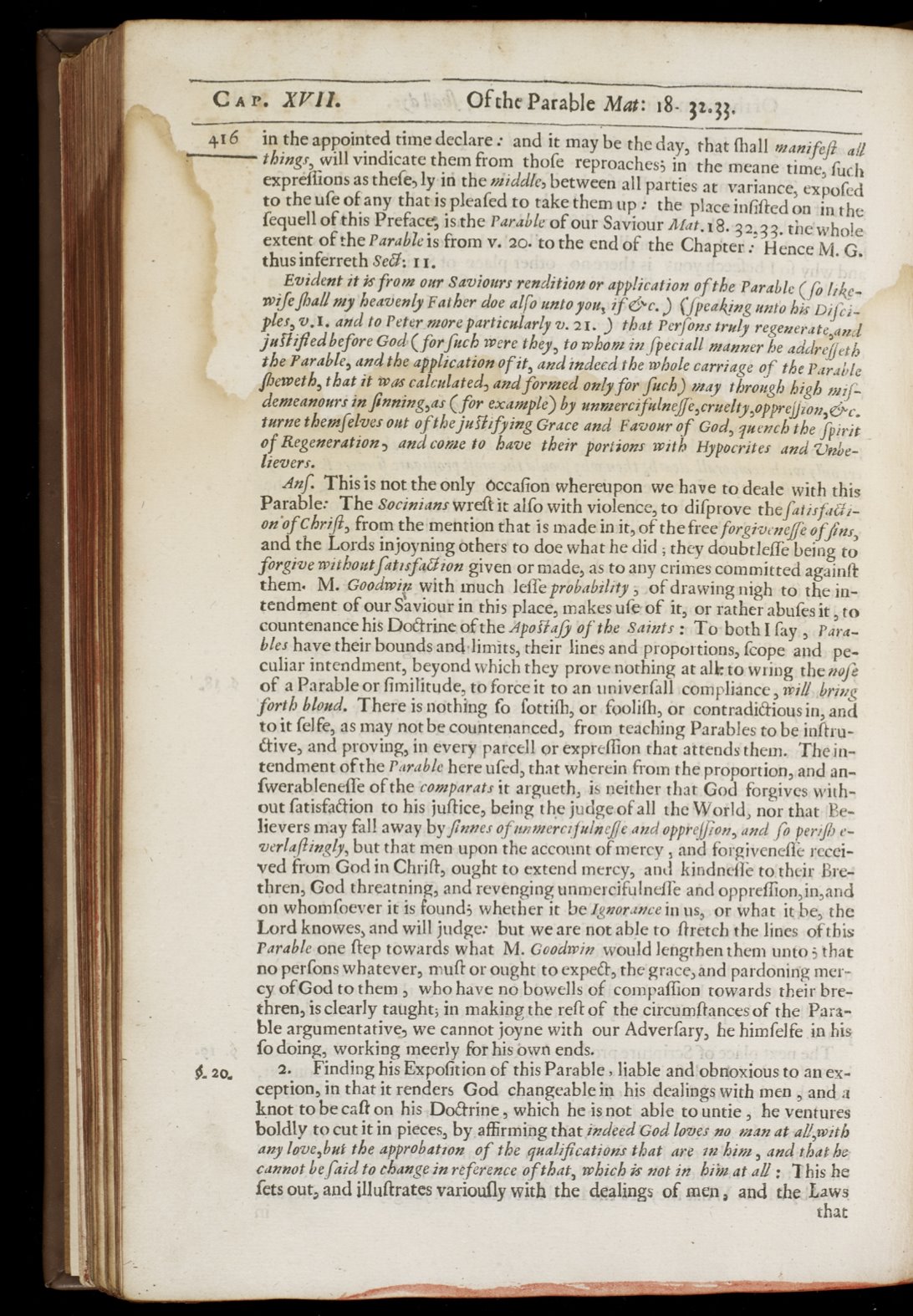

C
n
P.
XVII.
Ofthr
Parable Mat:
18.
32.33.
416 in
the
appointed time declare
:
and
it
may
be the day,
that
fhall inanifefl all
things, will
vindicate them from thofe reproaches;
in
the
meane time,
fuch
exprèflions
as
thefe,
ly
iii
the
middle,
between
all
parties at variance,
expofed
to
the
ufe
of
any
that
is
pleafed
to
take
them up
:
the
place infifted on-in
the
fequell
of
this
Prefaces,
isthe
Parable
of
our
Saviour Mat.
t
8.32,
33.
the-whole
extent
of
the
Parable is
from
v. 2o.
to
the end
of
the
Chapter
:
Hence
M.
G.
thus inferreth
Seel:
1
t.
Evident
it
is
from
our
Saviours
rendition
or application
of
the Parable
(fo
like,
wife
(hall
my
heavenly
Father
doe
alto unto
you,
if
6,c.
)
(fpeaking
unto his
Dif
ëi-
pies,
v.
i.
and
to
Peter more
particularly
v. 21.
)
that
Perfons
truly regenerate,and
juflified
before
God(
for
limb
were
they, to
whom
in fpeciall
manner
he adddreffeth
the
Parable,
and
the application
of
it, and
indeed
the
whole
carriage
of
the Parable
fheweth,
that it
was
calculated,
andformed
only
for fuch)
may through
high
nif-.
demeanours
inßnning,as
(for
example)
by
unmereifulneffe,criselty,opprejlion,
&c.
turne
themfelves
out
ofthejsethfying
Grace
and
Favour
of
God, quench the
fpirit
of
Regeneration,
and
come
to
have
their
portions
with.
Hypocrites
and
'Unbe-
lievers.
Anf.
This
is
not
the
only
occafion
whereupon
we
have
to
deale with this
Parable:
The
Socinians
wreft
it
allo with violence,
to
difprove the
fatisfatl-
on
of
Chri
/I,
from
the
'mention
that
is
made
in
it,
of
the
free forgivenefe
offsns,
and the
Lords injoyning
others
to doe what hedid
;
they doubtleffe
being
to
forgivewithoutfatssfatíion
given
or
made,
as
to
any crimes
committedagainfl:
them. M..Goodwis
with
much
lea
probability
,.of
drawing
nigh
to the in-
tendment
of
our
Saviour
in
this place, makes
tile
of
it, or rather
abufes
it,
to
countenance
his
Doctrine
of
the
Apoliafy'of
the
Saints
:
To
both
I
fay ,
Para-
bles
have their bounds and.limits, their
lines
and proportions,
(cope
and pe-
culiar
intendment, beyond
which
they
prove
nothing at
alb:
to
wring
thenofe
of
a
Parable or
fimilitude,
to
force
it
to
an univerfall compliance,
will bring
forth
blond.
There
is
nothing
fo
fottifh,
or.
foolifh,
or contradidious
in,
and
toit
fe]
fe,
as
may
not
be
countenanced,
from teaching Parables
to
be inftru-
dive,
and proving,
in
every parcell
or
exprefíion
that attends
them.:
The in-
tendment
of
the
Parable
here ufed,
that
wherein from
the proportion,
and
an-
fwerableneflè
of
the
comparats
it argueth,
is
neither
that
God forgives
with-
out
fatisfadion
to
his
juftice, being
the judge
of
all
the
World,
nor that
Be-
lieversmay
fall away by
f
nnes
ofunmerci
firm
JJe and
oppre
flon,
and
fo
perifli
e-
verlaflingly,
but that
men upon the account
of
mercy,
and forgiveneffe recei-
ved from God
in Chrift,
ought to extend
mercy, and kindneffè to.their
Bre-
thren,
God
threatning,
and revenging unmercifulneffe and
opprefìion,in,and
on whomfoever
it
is
found; whether it be
Ignorance in us,
or what it
he,
the
Lord
knowes, and will
judge: but
we
are not able
to
ftretch the
lines
of
this
Parable
one ftep towards
what
M.
Goodwin
would lengthen them
unto;
that
no
perlons
whatever,
muff
or ought
to
expel,
the
grace, and pardoning mer-
cy
of
God to
them , who have no bowells
of
compaffion
towards their bre-
thren,
is
clearly taught;
in making
the
reft
of
the circunifancesof the
Para-
ble argumentative,
we
cannot joyne
with
our
Adverfary,
he himfelfe
in his
fo doing,
working meetly
for his own
ends.
4
an
2.
Finding
his
Expofition
of
this
Parable
,
liable and'obnoxious
to
an
ex-
ception,
in
that
it
renders
God
changeable
in his dealings with men
,
and
a
knot to
be
call'
on
his
Doctrine,
which
he
is
not
able
to
untie he ventures
boldly to cut
it
in pieces,
by
affirming
that
indeed God
loves
no man
at
all,with
any
love,but the approbation
of
the ,qualifications
that
are
in
him,
and that
he
cannot
be
faid
to change
in
reference
of
that,
which is not
in
hiñs
at all
:
phis he
fets
out,
and
¡Nitrates
varioufly
with the dealings
of
men,
and the
laws
that










